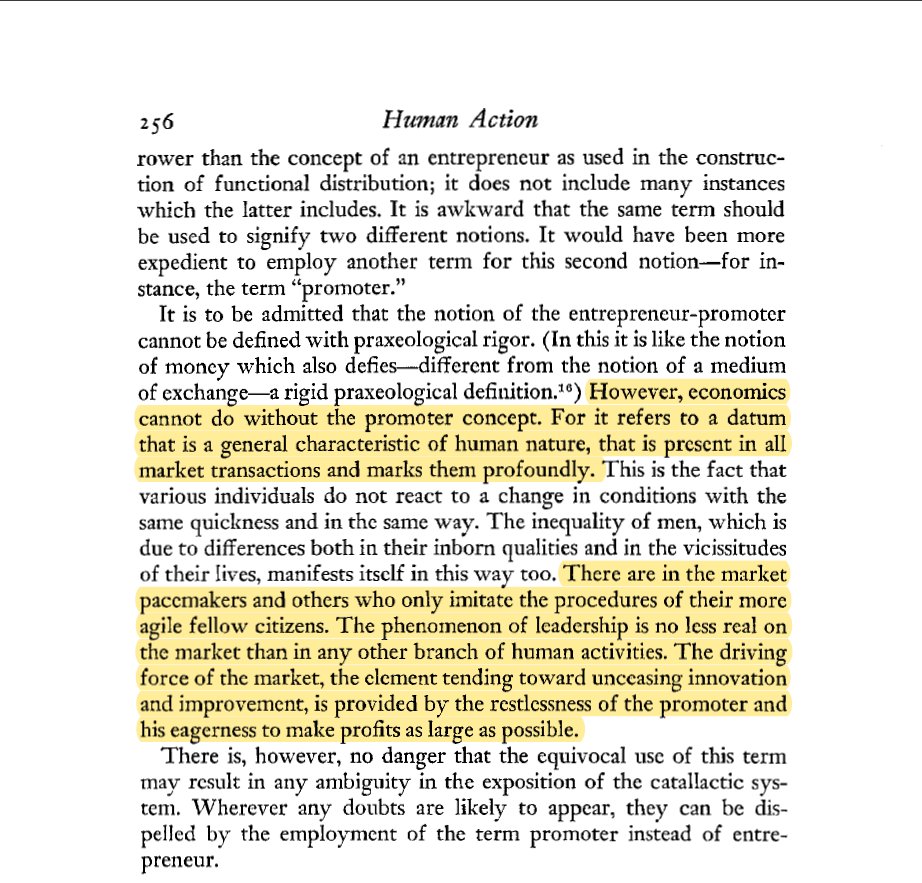
The role of #entrepreneurship in the market process is little understood. Even those who are well read in Ludwig von Mises's magnificent Human Action tend to get the economic function wrong, especially its implications for the structure and progression of the market process.
To Mises, entrepreneurship is 'simply' the uncertainty-bearing aspect of human action. This is his praxeological definition, which therefore offers us truths about how the structure of human action explains observable phenomena and cause-and-effect relationships in the market. 

This broad definition of entrepreneurship explains why some plans and decisions are unsuccessful, why different people may make different decisions, and why actors can reconsider/change their behavior before actions are concluded. Because the data change, actors learn and adapt.
Formalizing this insight into a model of the economy makes it into an adjustment process in the face of new discoveries. But this is insufficient to understand the market process. Such a model captures only how actions respond to unforeseen changes.
The market process as 'only' an adjustment/discovery process acknowledge the dynamic market process but limits actors' imagination to second-guessing changes in the data. Their actions are future-oriented only in the sense that they include in their plans expected changes.
Granted, one can stretch the concept to encompass innovative and disruptive action as well. But doing so goes beyond and even contradicts what Mises has in mind. Entrepreneurship broadly is simply action "in regard to the changes occurring in the [market] data." No more, no less.
Mises grants that there is a more important concept, which economics cannot do without: the entrepreneur-promoter. These entrepreneurs aren't responsive to changes but cause change to and disrupt the market. They're the "driving force" of change. 

It should be clear that in order to understand the progression of the market process, and the production that occurs in it, one cannot exclude the promoter. In fact, many of the changes that others respond to are caused by the innovative successes of imaginative promoters.
Unfortunately, Mises did not find a means to define the promoter praxeologically, thereby leaving it beyond what can be theorized in praxeology. But I argue this can in fact be done: qjae.scholasticahq.com/article/18212-…
In other words, Austrian economics has no reason (and no longer an excuse) to exclude promoters from their theorizing on the dynamics and progression of the market process, as is arguably the case with both Hayek and Kirzner. The market process is not obviously equilibrating.
Acknowledging the unique implications of the promoter shifts our theorizing away from what I call within-system theorizing, where actors respond to changes imposed on the system and/or observed ex post production in consumer revealed preferences.
With the promoter, the economy is disrupted and renewed, in almost Schumpeterian fashion, by actors in their roles as promoters. The possibilities and thus extents of the market shift as a result of endogenous novelty, a 'creative destruction' process if you will.
Promoters' imaginative undertakings, most of which are likely to fail, step ahead of where the market is currently at, and also what it supports, and leads the way to a new possible. Promoters are the "pacemakers" of the market process, in Mises's term, necessary for growth.
This requires some means for promoters to implement their imagined and potentially disruptive productions. Part of this is about experimentation with ideas, but the important point and function isn't to provide the promoter with the peace and quiet to improve their ideas.
The promoter's novel type of production is neither technologically nor economically efficient, but aims to be more value-creative. Promoters can and will be refine their novel production undertakings after consumers have confirmed the value through their purchasing actions.
I refer to the promoter's implementation of novel production as a firm, because it is distinct from market production, utilizes a different division of labor (the innovation), and is an all-or-nothing undertaking aimed at producing new economic value. routledge.com/The-Problem-of…
I think of the promoter as the catalyst of change and renewal, the endogenous force that pushes the market out of its "comfort zone," beyond what is already possible to establish through simple market contracting. The promoter causes value creation to take leaps forward.
It should be fairly obvious that disruptive innovation causes much of the change that non-promoter actors need to adapt to. It is also purely uncertain, since we cannot figure out what others imagine, if they pursue it, nor how consumers will react to these attempts.
Consequently, any theory of the market process, not to mention static models, that does not take into account the disruptive implications of (successful) promoters cannot provide an accurate understanding. Mises, judging from his discussion in Human Action, understood this.
• • •
Missing some Tweet in this thread? You can try to
force a refresh





